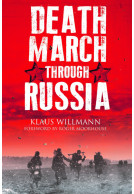Confessions of a Home Army Executioner (ePub)
A Memoir of the Polish Home Army

File Size: 882.6 KB (.epub)
Pages: 224
ISBN: 9781805000297
Published: 1st March 2024
| Other formats available - Buy the Hardback and get the eBook for £1.99! | Price |
|---|---|
| Confessions of a Home Army Executioner Hardback Add to Basket | £16.00 |
“This book is moral dynamite. It reveals not only what men can do in war but also what war can do to men.” – Norman Davies, historian and academic
Stefan Dąmbski joined the Polish Home Army in 1942 when he was just 16 years old. The Home Army formed the military wing of the Polish Underground, the resistance movement established to fight the Nazi occupation of Poland during the Second World War. During this occupation, the Home Army passed death sentences on hundreds of individuals – both Nazi enemies and colluding Polish compatriots. As one of the few Home Army members who volunteered to carry out these death sentences, the young Dąmbski quickly became a seasoned executioner.
In July 1945, Dąmbski was transferred to the West and ended up in the United States where he remained until his death in 1993. In his final years, Dąmbski recorded his story in fascinating, shocking detail. After his death, his memoirs came into the possession of his niece and nephew before eventually arriving at the KARTA Foundation in 2005. Initially published in the original Polish, Sobieralski’s translation of Dąmbski’s records now gives English-language readers a hugely important insight into the mind of this seasoned executioner. Readers are made aware of the facts and actions of Dąmbski’s life, but are witness to the lifelong moral struggle that accompanied these actions and led him to reflect on ideas of heroism, patriotism, guilt and on the very act of war itself.
Marek Sobieralski, based in Wiltshire, regularly writes for History of War magazine and published his first book, The Katyn Diaries, in 2021. This was a collection of diaries of Polish military officers murdered by the NKVD in 1940, translated into English. He continues to work on various diverse writing projects.
Confessions of a Home Army Executioner is a moral inquiry into the darkest corners of human actions during war. It is a significant contribution to the literature on World War II and a must-read for anyone seeking to comprehend the complex tapestry of human morality in times of conflict. This book is a powerful reminder that history is not just about events, but about the individuals who live through them and are forever changed by their experiences.
NetGalley, J. Kromrie
Rating: 5 out of 5 stars
NetGalley, Elizabeth Meade
This was a very interesting, but very heavy, book about World War II. Before I get into the review, this is definitely a book that I would only recommend to adults (18+). There are a lot of graphic descriptions of real-life violence, from the perspective of someone who actually did it. There is also a great deal of discussion of Nazism, the Holocaust, murder, rape, war crimes, guns, Soviet oppression, death, and war. I will not describe any of these events graphically in this review, but this book is literally centered around all of these things.
The book largely consists of a memoir written by Stefan Dambski, the titular Home Army Executioner; an American citizen who emigrated from Poland during WWII after serving in Poland’s Home Army. However, there is also some commentary/introduction of the memoir by other writers, including forewords by two other writers, an introduction by Sobieralski, who translated the work from Polish into English; and Dambski’s daughter Teresa.
One thing that instantly impressed me about this book was Dambski’s ability to condense such a dark and thought-provoking narrative into such a short book. The entire text is less than 200 pages long. Yet it never feels like anything is “missing”—while there are almost certainly aspects of his experience that he did not include in the book, he does a great job of giving the “gist” of what happened.
The Home Army was a multifaceted organization in Poland during WWII, which first fought against the Nazis, then later the Soviets and Ukrainians. The Home Army did have its own nationalist views to some extent, though the entire history and views of the organization are not discussed in this book. Dambski, as an executioner, was sent to kill Nazis, those collaborating with Nazis, then later Soviets and Ukrainians, including civilians who were not involved in any of the Ukrainian attacks on the Polish.
Reading the narrative forces the reader to ask themselves many questions, most of which have no easy answers. Were Dambski’s actions justified? If so, to what extent? While resisting the Nazis was ultimately a good thing, were Dambski and the Home Army actually resisting because of the Nazis’ genocide of Jewish people and others the Nazis wanted to eliminate, or were they only doing it out of a sense of Polish nationalism? Were their actions effective? Were Dambski’s actions against the Ukrainians, many of whom were uninvolved with the conflict, the result of his moral callousness after years of executing people? Did he want to remain loyal to the Home Army? Why did the Home Army make decisions with such different moral underpinnings and implications over time? Even Dambski himself does not have clear answers to these questions.
Personally, I found it very interesting to read the true, grim story of a teenager going down the path of politically-motivated killings and changing as a person because of it, as well as how he saw the events later on. As memoirist, Dambski certainly shows remorse for his actions given the benefit of hindsight. His narrative raises the point that regardless of the intentions or the merits of resisting the Nazis, it is simply unavoidable that war and killing will have a negative effect on people. Even a war that was completely justified would still lead to massive trauma for everyone involved. I was impressed that the book managed to raise questions about war in general, despite focusing on one particular situation.
I definitely recommend this book if you are interested in the subject matter.
Rating: 5 out of 5 stars
NetGalley, Brenda Carleton
Confessions of a Home Army Executioner by Marek Sobieralski is the riveting memoir of Stefan Dąmbski who at a young age joined Armia Krajowa in German-occupied Poland during World War II. He eventually volunteered to execute Nazi enemies and Polish compatriots, a grim and distasteful job.
Horrendous details aren't glossed over. But war is devastating in every way. Stefan exhibited a cold detachment as would be necessary under such circumstances. He didn't take his violent duties lightly and described how he was able to kill, how he felt about it and the effects on him. The tone is matter of fact and he didn't glorify his actions. Getting into his mind was fascinating and unsettling. Not an easy read, naturally, but an important one.
Rating: 5 out of 5 stars
NetGalley, Kathryn McLeer
This had the memoir elements that I was looking for. It had a great story to tell and it felt like I got to know Stefan Dąmbski. It had everything that I was looking for from a memoir.
Rating: 5 out of 5 stars
NetGalley, Claire Smith
A truly chilling read.
The author has given a no thrills look at how it was to be in the polish home army during the invasions of both Germany and Russia during the time of WW2.
The unique insight into the life of an executioner during that time is important to understand but the matter of fact way that it is described is factual and on a human side haunting.
Rating: 5 out of 5 stars
NetGalley, Joseph Malek
“The local population, as always, was at the mercy of people who were participating in the war.”
Stefan Dąmbski’s recollections of his time in the Polish Home Army during the Second World War are a sobering reminder of what violence humans are capable. He speaks only of actions he committed, or witnessed, and does not speculate as to the actions of others. The matter-of-fact way in which Dąmbski describes his “liquidation” work gives the impression of a cold-hearted man. It feels easy to condemn Dąmbski for such brutal wartime actions, but he knows this and condemns himself. There is no celebration or righteousness evident, and he does not seek absolution. Dąmbski provides context for his decisions and shares his understanding of why he and some of his fellows participated in executions.
On a larger scale, this book helps to fill a gap in understanding Europe’s resistance movements during the Second World War. As noted in the introductory materials, most attention is given to the French resistance in English-language books and media covering Nazi resistance in Europe. There are myriad reasons for this – one perhaps being the danger for Eastern Europeans who found themselves in Soviet-controlled states after the war, like Dąmbski himself – but the result is the same. Dąmbski helps to fill in some of those missing pieces.
Confessions of a Home Army Executioner is an important addition to popular understanding of the Second World War in Europe. Beyond that, it is also an incredible look into the mind of a young man in the grips of war. I would recommend this to anyone – both inside and outside of higher education.
About Marek Sobieralski
Marek Sobieralski, based in Wiltshire, England, regularly writes for History of War magazine, and published his first book – The Katyn Diaries – in 2021. This is a collection of diaries of Polish military officers murdered by the NKVD in 1940, translated into English. He continues to work on various diverse writing projects.
About Roger Moorhouse
Roger Moorhouse is an historian of the Third Reich. He is the author of the acclaimed Hitler's Third Reich in 100 Objects and The Devil's Alliance, and has been published in more than 20 languages. He is also a tour guide and visiting professor at Warsaw's College of Europe. You can see him on Twitter at @Roger_Moorhouse.






















